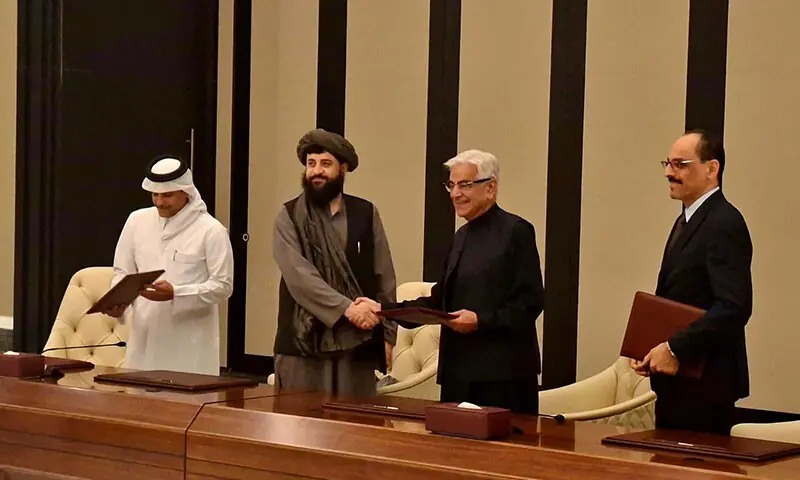Despite signing a ceasefire agreement with Pakistan in Doha, the Afghan Taliban continue to sabotage the spirit and credibility of the deal through contradictory statements, refusal to publish full terms, and politicisation of critical security issues — most notably the status of the Durand Line and the presence of TTP militants on Afghan soil.
The Taliban’s Ministry of Defence issued a statement Friday claiming there are no secret clauses in the agreement, insisting that Defence Minister Mullah Yaqoob Mujahid had already explained the entire content publicly. However, this version starkly contrasts with remarks from Pakistan’s Defence Minister Khawaja Asif, who told national media that the agreement is confidential and that he could not disclose its full details.
This clear contradiction has raised serious concerns in Islamabad, with officials warning that the Taliban are deliberately creating ambiguity to avoid accountability while exploiting the agreement for political optics.
Refusal to Condemn TTP Further Fuels Distrust
Perhaps the biggest source of alarm is the Taliban’s consistent refusal to recognize the Tehreek-e-Taliban Pakistan (TTP) as a terrorist group, even after repeated cross-border attacks have killed scores of Pakistani security personnel.
Instead of cooperating, Mullah Yaqoob has gone as far as urging Pakistan to hold talks with the TTP, portraying the terror outfit as a political stakeholder — an approach that Islamabad flatly rejects.
“This isn’t diplomacy — this is appeasement of terrorists,” a senior Pakistani security official commented, adding that no ceasefire can be taken seriously while the Taliban continue to harbour and legitimise anti-Pakistan militants.
Durand Line: A Settled Border Turned Political Tool
The Taliban’s recent moves have also revived tensions over the Durand Line, the internationally recognised boundary between Pakistan and Afghanistan. After Qatar’s Foreign Ministry initially used the term “border” in its ceasefire announcement, Kabul reportedly protested, leading to a quiet revision of the wording.
In a press conference, Mullah Yaqoob went further, calling the Durand Line an “imaginary line”, dismissing the legal status of the frontier and drawing sharp criticism from Pakistani officials, who see this as a deliberate attempt to delegitimize Pakistan’s territorial integrity.
Pakistani analysts argue that the Taliban are weaponizing the Durand Line issue to distract from their internal failures and to rally nationalist sentiment at home — all at the expense of regional stability.
“When the Taliban have nothing to offer their people, they turn to old tactics — fuelling anti-Pakistan narratives to maintain control,” said a political observer in Islamabad.
Taliban’s Lack of Transparency Raises Further Alarms
Adding to the distrust, the Taliban have refused to publish the full text of the agreement, despite claiming it is non-confidential. Pakistani stakeholders view this as a tactical decision to retain deniability, while portraying themselves as cooperative in the eyes of international mediators.
Meanwhile, Pakistan continues to bear the brunt of the fallout; from unregulated cross-border movement, to an uptick in terror attacks, and to growing pressure over the return of Afghan nationals.
Mediators Urge Calm, But Ground Realities Say Otherwise
The ceasefire deal, brokered by Qatar with the involvement of Türkiye, was initially hailed as a breakthrough. It included the formation of a joint technical committee to monitor implementation and resolve disputes.
Qatar’s Foreign Ministry expressed hope that the agreement would ease tensions and pave the way for long-term cooperation. But with every passing day, Taliban statements and behaviour point toward non-compliance, political exploitation, and a reluctance to honour even the basic principles of the agreement.
In Islamabad, the mood is shifting from cautious optimism to mounting frustration — with many now questioning how long Pakistan can trust a partner that refuses to name its enemies, and won’t even call a border a border.





